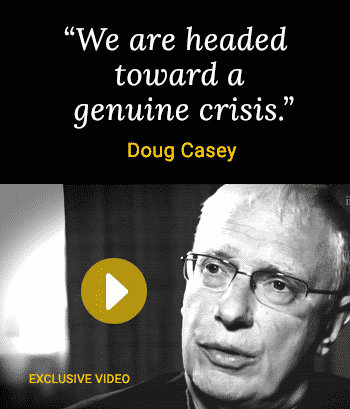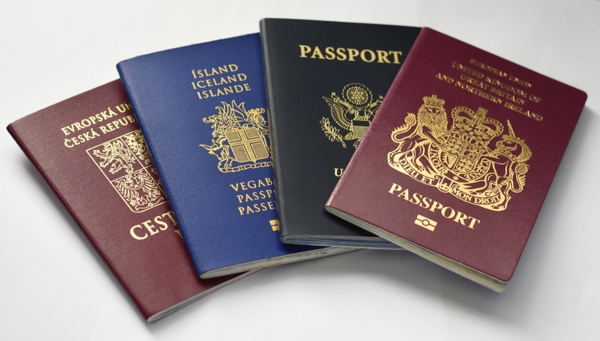A Special Preview of Doug Casey’s New Novel: Drug Lord (Part 2)
Nick’s Note: Today, we're sharing part two of our special preview of Doug Casey's brand-new novel, Drug Lord. If you missed the first part of the story, you can catch up right here.
Chapter 1, Part 2
Return to the Front
The officer turned back to Charles. “We will examine this boat, sir, and will remove all contraband and impound your vessel as necessary. You have an assault weapon on board.”
“You mean I have a semi-automatic rifle.”
“An AR-15 is an assault weapon, sir.”
Charles’s tendency to question authority overtook him.
“Why do you believe that?” he said before he could stop himself. “Because it looks like an automatic weapon? Like that M240 machine gun your man is, rather impolitely, pointing at me? Calling a civilian semi-automatic rifle an assault weapon doesn’t make it one. Someone in your position should know that.”
Was the officer an ignorant victim of propaganda and doublespeak? Or a purveyor of it? Most people were both.
The most effective and destructive lies are the lies one tells oneself.
“It is an assault weapon,” the man repeated.
Hear or say anything enough times, with enough certainty, and it becomes the truth. Brainwashing was the real assault weapon.
| Recommended Link | ||
|
||
| — |
Attempting to counteract brainwashing with logic usually proved quixotic. But right now it served to distract the man from fully supervising his underlings. So Charles asked, “What makes you think it’s an assault weapon?”
“As a matter of law, the pistol grip and the flash suppressor are the most relevant criteria … sir.”
“The ever-dangerous pistol grip,” Charles said. “Without that pistol grip, I suppose there’s no way I could assault anyone with it. Is that what they teach at Homeland Security School?”
The officer kept his cool, despite his evident desire to punch Charles in the face. His training helped him maintain a pretense to the moral high ground, however robotically.
“What was your departure port?” the officer demanded.
“I’ve been traveling the world.”
“Answer the question, sir. What was your port of departure?”
“I’m coming in straight from the Bahamas—Nassau, most recently.”
“You possessed that weapon in the Bahamas?”
The weapon was illegal on shore in most places he had visited, but he hadn’t carried that particular weapon on shore. Charles saw no need to answer the question.
“Sir, what is your citizenship?”
More of Don Quixote emerged. “I’m an American, but I carry a U.S. passport.”
The officer glared at him as he climbed aboard the sailboat. “Clarify. Are you a U.S. citizen?”
“As I said, I am American. I’m also a U.S. citizen.”
“My name is Petty Officer Chittingham. One of my men will go below with you to retrieve your passport and your manifest. Do not attempt to reach for anything that might conceivably be a weapon.”
“Petty Officer Chittingham, why do you believe you have the authority to order me around on my own boat?”
“We are the Department of Homeland Security. Do as you are told!” The man’s trained demeanor faltered.
“Of course.”
| Recommended Link | ||
|
||
| — |
Charles felt himself tip toward flinging sardonic insults. Doing so would be a departure from both his upbringing and his usual friendly approach to dealing with others. His father, had he overheard the remarks that Charles so far avoided saying out loud, would be horrified, and as angry as he ever became.
Not to mention, sardonic insults might lead to Charles getting handcuffed.
Charles went below and obtained his documents. He watched the men as they searched the boat, opening each compartment, squeezing every life jacket. They found a pump-action shotgun and a 9 mm Glock pistol, and carried them up on deck. But they hadn’t found the drugs. Not yet.
“Why do you carry all these weapons on board?” Petty Officer Chittingham demanded.
Charles answered truthfully. “In case I run into people who insist on boarding my boat against my will and want to take my stuff.”
“You’re worried about piracy?”
“Exactly. Pirates.” Charles watched the petty officer for a response, but the man didn’t seem amenable to incisive introspection. “These guns are my last resort. After cooperation, hospitality, and friendly smiles have failed.”
“What is your intent with these weapons once you land?”
“They’re not for sale or transfer.”
“Do you have any contraband on board?”
“You would have found it, don’t you think?”
“Perhaps a small amount of illegal drugs?”
“There are no narcotics on this boat.”
Chittingham flipped through Charles’s passport and mentioned quietly, “This expires next year.” He flipped some more. “You’re very well traveled, Mr. Knight. When was the last time you were in the United States?”
“Seven years ago.”
The officer stared at Charles for far too long, and then asked, “You’re heading into Charleston?”
“That’s right.”
“Check in with the port authority immediately upon entrance into the harbor.”
“I will.”
“Welcome back to America,” the man said with an edge of spite.
Charles replied, “I’m hoping there’s still some left.”
“What’s that?” the man spat back.
Charles didn’t clarify. There was no percentage in tilting at that particular windmill.
The Coast Guard men jumped back aboard their Defender. For good measure the man on the bow aimed the muzzle of his mounted machine straight at Charles again. Charles smiled at them as they accelerated and sped away.
His heart pounded. He took a few deep breaths in an attempt to calm himself. But the clamor of the luffing mainsail triggered a Pavlovian urge to reassert control, and until he did, the tension would persist. He turned the wheel to port, bringing the boat off the wind until the boom fell to leeward and the mainsail filled, silencing the fretful noise. He kept turning until his boat aimed back toward Charleston. He pressed the button that shut down the engine. The peacefulness of the downwind sailing blessed him with needed serenity, and his heart began to calm.
Sourced from the far side of the world, his drugs remained well hidden behind a tightly bolted, corroded, and salt-caked aluminum fitting at the base of the mast, in the deepest part of his bilge, down near where it mounted onto the keel. Charles knew from painful personal experience that it was a miserable place for a man to crouch to work. And no dog had ever been trained to sniff out the particular drugs he had chosen as his first foray into his new career.
He looked toward the entrance to Charleston Harbor several miles away. He hoped to make it in before the sun set.
The winds blew well for what would be the last brief leg of his long voyage. He hauled out the genoa. It filled, and the boat leapt forward two knots faster.
Charles stared up past his mainsail at the erect but slightly curved mast. He laughed aloud at a joke, one that the sloop’s namesake, the human Caroline—so lovely, so kind, so honest—would have appreciated. Actually, she would have hit him. Playfully, of course.
Caroline’s family duties had carried her away from him, probably forever. All he had of her now were fond memories of their past together. That, and this lovely boat that bore her name and carried him toward a destiny he could not conceive.
Nick’s Note: To find out what happens next, make sure to purchase your copy of Drug Lord right here.
Tags:








